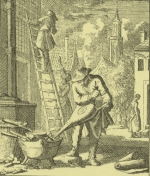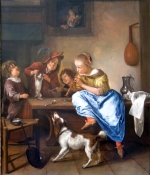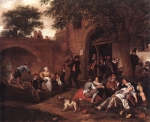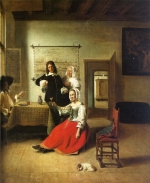Tax Farmers
The Romans developed the practice to collect taxes in their far-flung empire reliably and without the need for an expensive bureaucracy. An individual or small group paid the taxes and then were allowed a specified time to collect what they could either in cash or goods. It carried both high risks and high yields. The upside of "what they could" balanced the risk but made the system ripe for abuse. In the New Testament, the tax farmers are the publicans, whom the people despised as extortionists and thieves and whom Jesus compared favorably to pharisees, the pious legal scholars. Matthew, one of his disciples, was a publican before he followed Jesus.
The practice continued through the middle ages and throughout Europe and western Asia. The word farm to describe an agricultural enterprise comes from the same Latin root. When the feudal lord owned all the land, he rented it for a fixed price to people who then harvested what they could in crops. Feast or famine, they paid the same.

Piedfort silver ducat, 1664
Tax collection in Delft
Tax farming was used by the Dutch Republic for the same reasons the Romans used it: to reduce risk and reduce costs. The bidding process, ripe for abuse, was monitored by third parties. While tax collectors (ontvangers) could get wealthy, they came from and remained in a lower-status social group than the regents.
The Delft's treasurer's account books always begin with the revenue from the lease of tax collection rights to farmers who bid for those rights. The 1658-81 Excises page under Treasurers on the right-sidebar menu has a table of the taxes and the revenue the generated between 1658 and 1681. The risk calculation must have been complex. Some goods could be counted and others could be weighed, neither of which required much technical expertise. But some goods had to be measured, including expensive liquids such as alcoholic beverages and cooking oils. As wine gauger, Leeuwnehoek played an important role by determining the amount of wine in the barrels so that the correct tax could be paid. Two of the key factors was a high level of taxation and a high degree of voluntary compliance. It was crucial to the system that the City's inspectors, the beer and wine gaugers (peijlers or ijkers) be impartial and objective.
During the years after Leeuwenhoek was a city official, the same names of tax farmers appear repeatedly in the Treasurer's account books. It might be a different tax or an additional one. Only a couple were women; one of them was Leeuwenhoek's sister.
Leeuwenhoek's relatives
Two of Leeuwenhoek's relatives are listed in the Treasurer's accounts as paying excise taxes.
Maerten Huijchs Leeuwenhoek was Antony's cousin, son of his uncle Huijch, the only surviving sibling of Antony's father Philips. Maerten was a tax collector (ontvanger) beginning in 1660, the same year his cousin Antony became camerbewaarder. He farmed one tax or another until his death in 1694.
Catharina Philips Leeuwenhoek was Antony's sister. For fifteen years in the 1670's and 1680's and into the 1690's, she was the collector for the excise tax on auctioned buildings (boelhuijsen).
The Manuaal betreffende de pachters (Manual concerning the tax farmers) referenced below has lists, by excise tax, of all the collectors and amount they paid to the city from 1631 to 1795. We have no record of how much they collected. Because of the nature of the goods that were taxed, food and drink, more of them would be consumed as the population grew. During Leeuwenhoek's career with the City, the population grew and then shrank again. Thus, more beer and fish were consumed. Yet the excise taxes remain flat during that time. Some of the people noted below must have been making a lot of money.















